Impact of Brexit on Airline Industry and Fiscal/Monetary Policies
VerifiedAdded on 2020/10/22
|6
|809
|282
Report
AI Summary
This report provides an overview of monetary and fiscal policies, including their types and instruments. It examines the impact of Brexit on the UK airline industry, focusing on the effects of policy changes on the sector. The report explores expansionary and contractionary monetary and fiscal policies, detailing the instruments used to regulate money supply, interest rates, government expenditure, and taxation. It analyzes how these policies influence economic stability, inflation, employment, and investment, specifically in the context of the UK's departure from the European Union and its implications for the airline industry. The report references key economic theories and provides a conclusion summarizing the findings on the relationship between economic policies and the airline industry's performance in response to significant economic events.
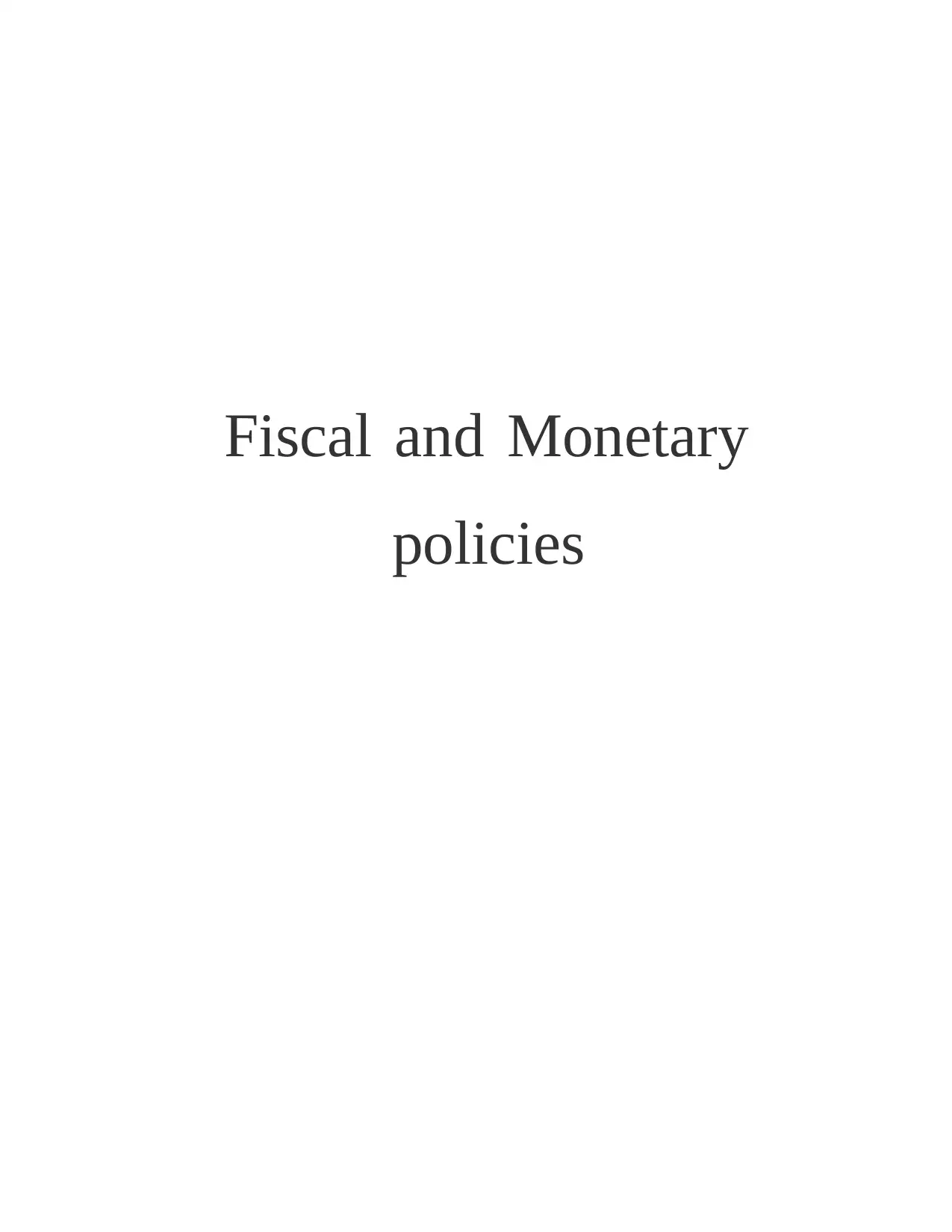
Fiscal and Monetary
policies
policies
Paraphrase This Document
Need a fresh take? Get an instant paraphrase of this document with our AI Paraphraser
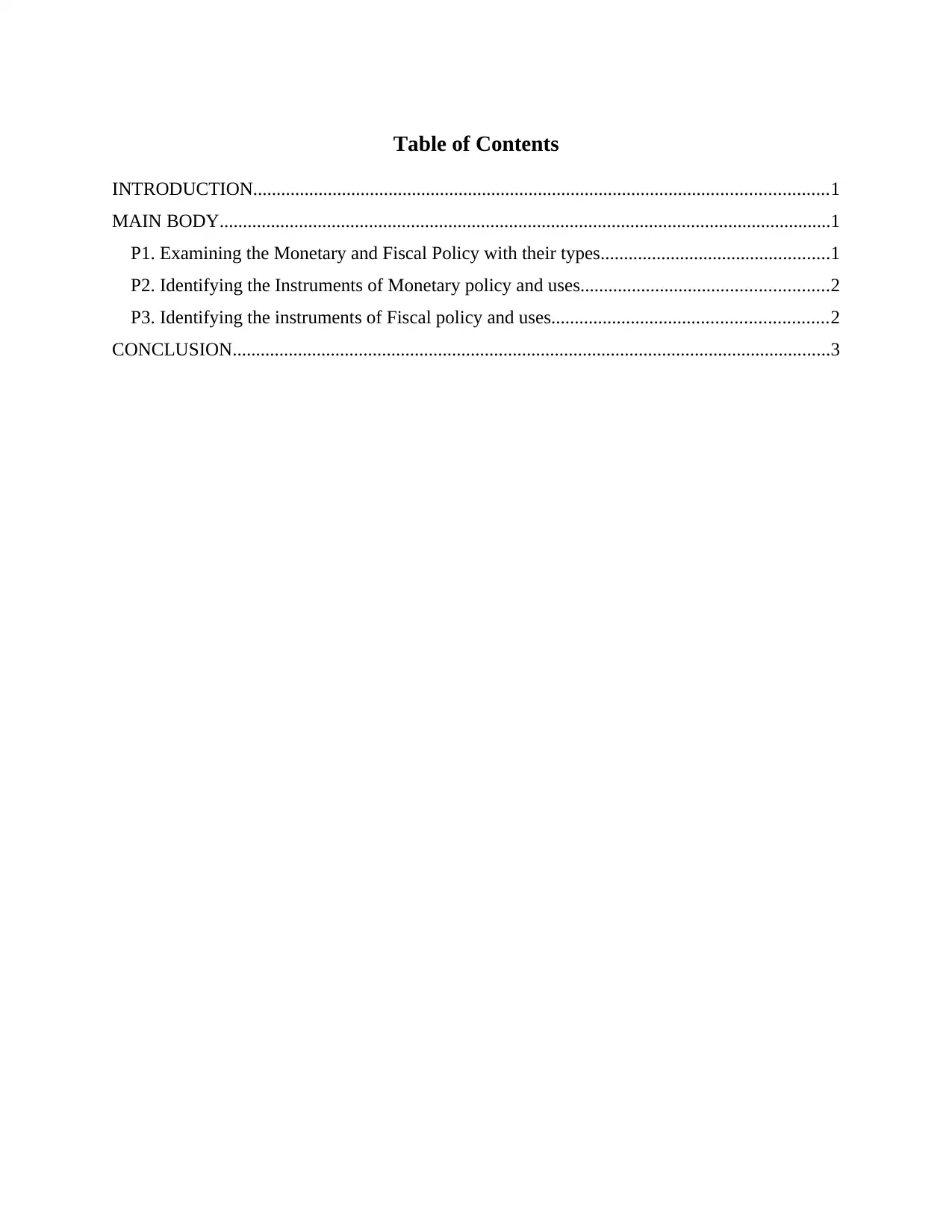
Table of Contents
INTRODUCTION...........................................................................................................................1
MAIN BODY...................................................................................................................................1
P1. Examining the Monetary and Fiscal Policy with their types.................................................1
P2. Identifying the Instruments of Monetary policy and uses.....................................................2
P3. Identifying the instruments of Fiscal policy and uses...........................................................2
CONCLUSION................................................................................................................................3
INTRODUCTION...........................................................................................................................1
MAIN BODY...................................................................................................................................1
P1. Examining the Monetary and Fiscal Policy with their types.................................................1
P2. Identifying the Instruments of Monetary policy and uses.....................................................2
P3. Identifying the instruments of Fiscal policy and uses...........................................................2
CONCLUSION................................................................................................................................3
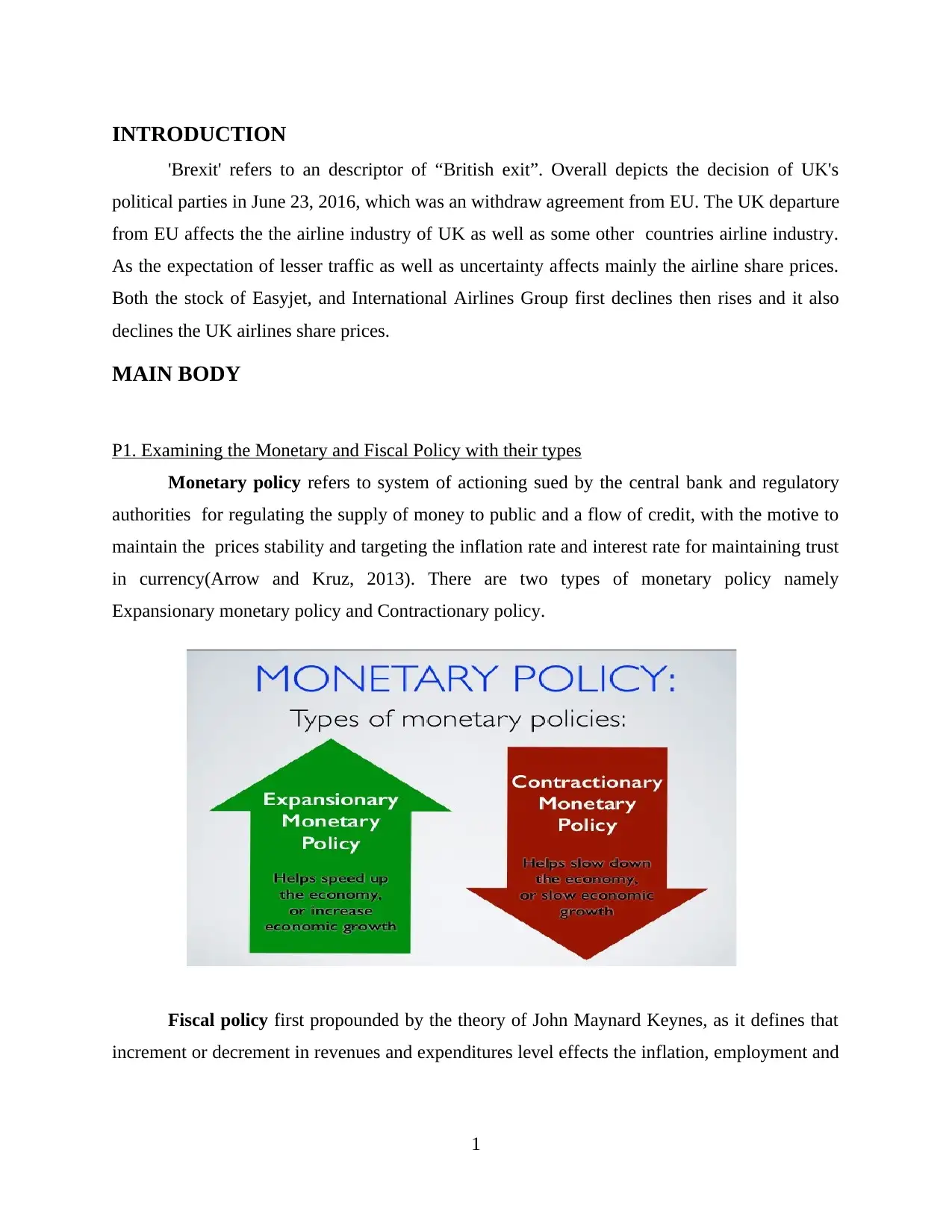
INTRODUCTION
'Brexit' refers to an descriptor of “British exit”. Overall depicts the decision of UK's
political parties in June 23, 2016, which was an withdraw agreement from EU. The UK departure
from EU affects the the airline industry of UK as well as some other countries airline industry.
As the expectation of lesser traffic as well as uncertainty affects mainly the airline share prices.
Both the stock of Easyjet, and International Airlines Group first declines then rises and it also
declines the UK airlines share prices.
MAIN BODY
P1. Examining the Monetary and Fiscal Policy with their types
Monetary policy refers to system of actioning sued by the central bank and regulatory
authorities for regulating the supply of money to public and a flow of credit, with the motive to
maintain the prices stability and targeting the inflation rate and interest rate for maintaining trust
in currency(Arrow and Kruz, 2013). There are two types of monetary policy namely
Expansionary monetary policy and Contractionary policy.
Fiscal policy first propounded by the theory of John Maynard Keynes, as it defines that
increment or decrement in revenues and expenditures level effects the inflation, employment and
1
'Brexit' refers to an descriptor of “British exit”. Overall depicts the decision of UK's
political parties in June 23, 2016, which was an withdraw agreement from EU. The UK departure
from EU affects the the airline industry of UK as well as some other countries airline industry.
As the expectation of lesser traffic as well as uncertainty affects mainly the airline share prices.
Both the stock of Easyjet, and International Airlines Group first declines then rises and it also
declines the UK airlines share prices.
MAIN BODY
P1. Examining the Monetary and Fiscal Policy with their types
Monetary policy refers to system of actioning sued by the central bank and regulatory
authorities for regulating the supply of money to public and a flow of credit, with the motive to
maintain the prices stability and targeting the inflation rate and interest rate for maintaining trust
in currency(Arrow and Kruz, 2013). There are two types of monetary policy namely
Expansionary monetary policy and Contractionary policy.
Fiscal policy first propounded by the theory of John Maynard Keynes, as it defines that
increment or decrement in revenues and expenditures level effects the inflation, employment and
1
⊘ This is a preview!⊘
Do you want full access?
Subscribe today to unlock all pages.

Trusted by 1+ million students worldwide
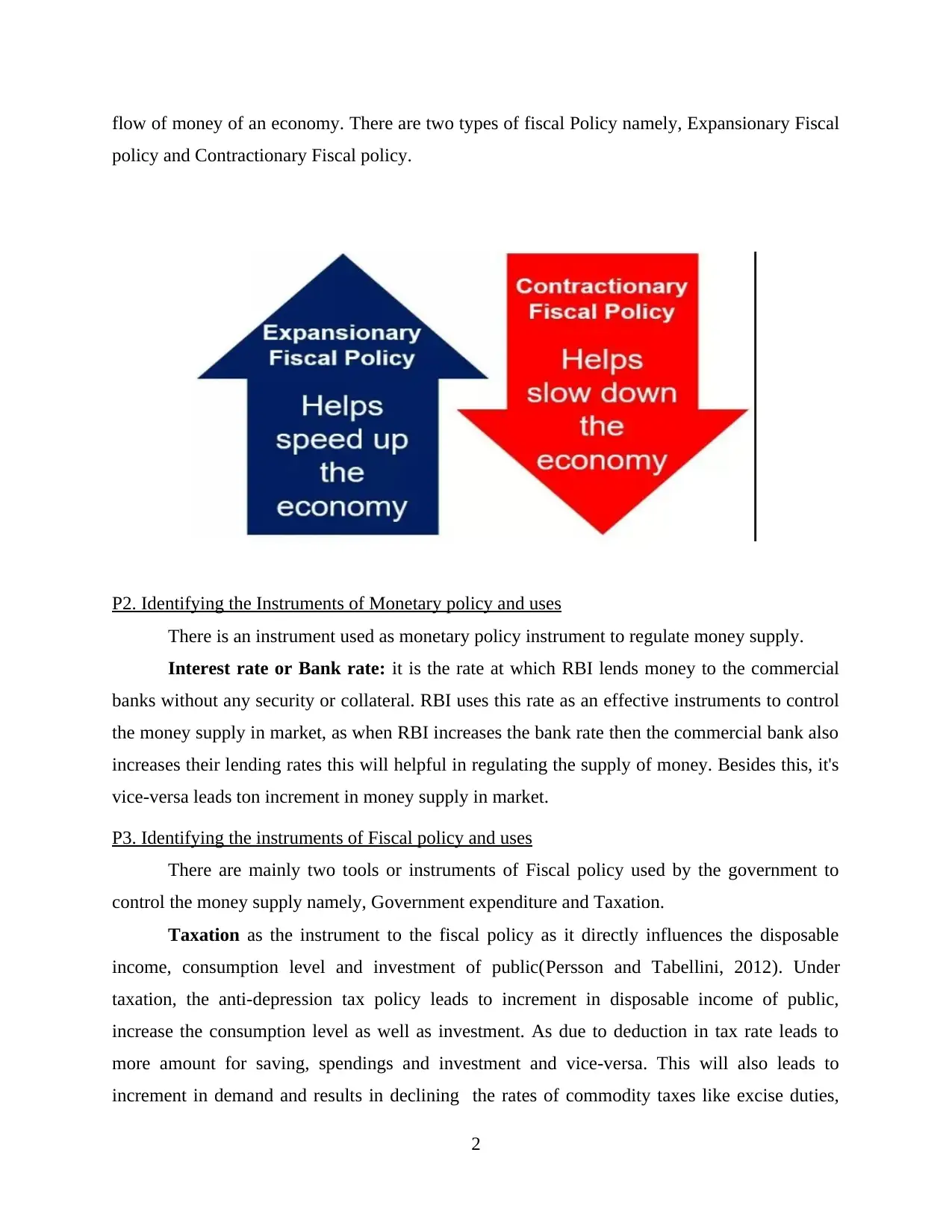
flow of money of an economy. There are two types of fiscal Policy namely, Expansionary Fiscal
policy and Contractionary Fiscal policy.
P2. Identifying the Instruments of Monetary policy and uses
There is an instrument used as monetary policy instrument to regulate money supply.
Interest rate or Bank rate: it is the rate at which RBI lends money to the commercial
banks without any security or collateral. RBI uses this rate as an effective instruments to control
the money supply in market, as when RBI increases the bank rate then the commercial bank also
increases their lending rates this will helpful in regulating the supply of money. Besides this, it's
vice-versa leads ton increment in money supply in market.
P3. Identifying the instruments of Fiscal policy and uses
There are mainly two tools or instruments of Fiscal policy used by the government to
control the money supply namely, Government expenditure and Taxation.
Taxation as the instrument to the fiscal policy as it directly influences the disposable
income, consumption level and investment of public(Persson and Tabellini, 2012). Under
taxation, the anti-depression tax policy leads to increment in disposable income of public,
increase the consumption level as well as investment. As due to deduction in tax rate leads to
more amount for saving, spendings and investment and vice-versa. This will also leads to
increment in demand and results in declining the rates of commodity taxes like excise duties,
2
policy and Contractionary Fiscal policy.
P2. Identifying the Instruments of Monetary policy and uses
There is an instrument used as monetary policy instrument to regulate money supply.
Interest rate or Bank rate: it is the rate at which RBI lends money to the commercial
banks without any security or collateral. RBI uses this rate as an effective instruments to control
the money supply in market, as when RBI increases the bank rate then the commercial bank also
increases their lending rates this will helpful in regulating the supply of money. Besides this, it's
vice-versa leads ton increment in money supply in market.
P3. Identifying the instruments of Fiscal policy and uses
There are mainly two tools or instruments of Fiscal policy used by the government to
control the money supply namely, Government expenditure and Taxation.
Taxation as the instrument to the fiscal policy as it directly influences the disposable
income, consumption level and investment of public(Persson and Tabellini, 2012). Under
taxation, the anti-depression tax policy leads to increment in disposable income of public,
increase the consumption level as well as investment. As due to deduction in tax rate leads to
more amount for saving, spendings and investment and vice-versa. This will also leads to
increment in demand and results in declining the rates of commodity taxes like excise duties,
2
Paraphrase This Document
Need a fresh take? Get an instant paraphrase of this document with our AI Paraphraser
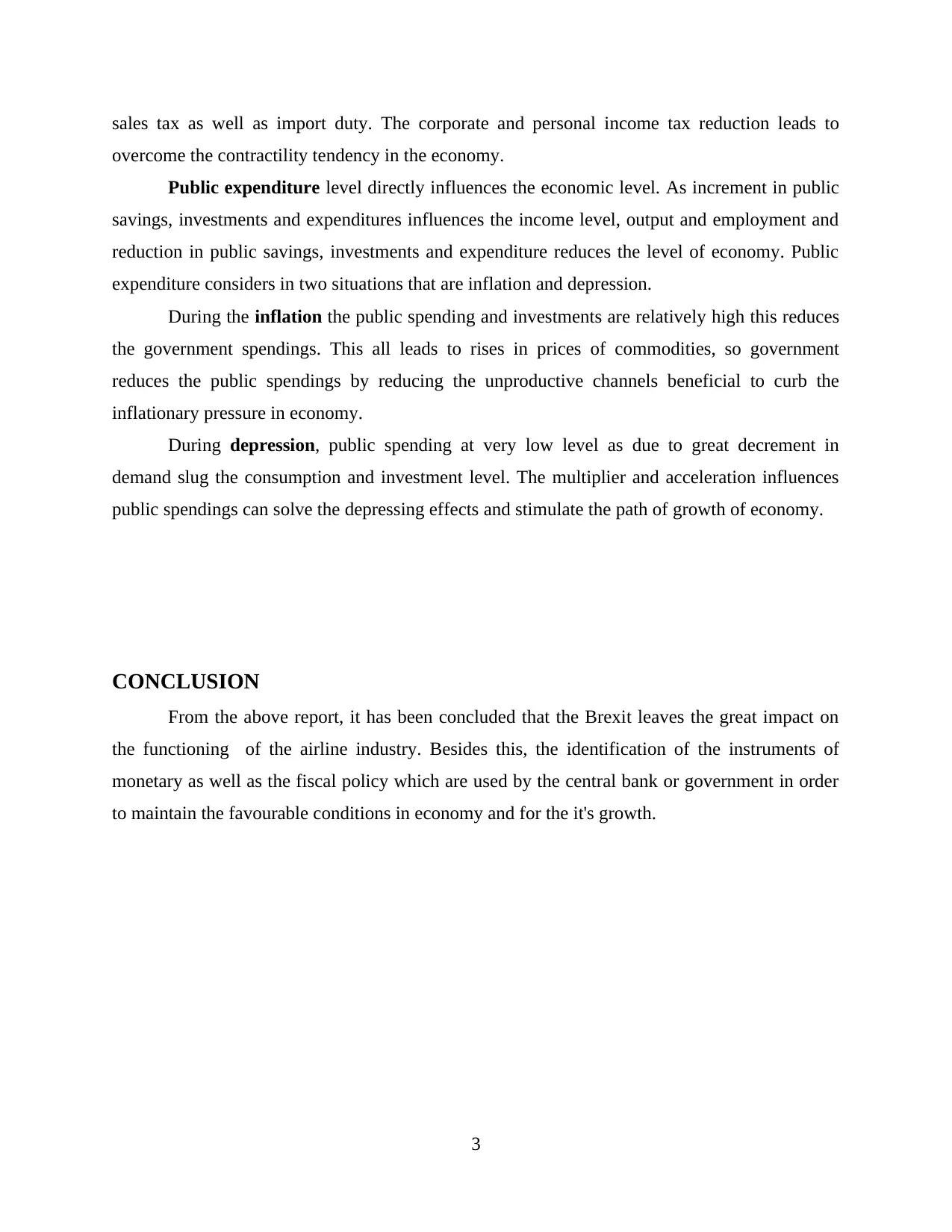
sales tax as well as import duty. The corporate and personal income tax reduction leads to
overcome the contractility tendency in the economy.
Public expenditure level directly influences the economic level. As increment in public
savings, investments and expenditures influences the income level, output and employment and
reduction in public savings, investments and expenditure reduces the level of economy. Public
expenditure considers in two situations that are inflation and depression.
During the inflation the public spending and investments are relatively high this reduces
the government spendings. This all leads to rises in prices of commodities, so government
reduces the public spendings by reducing the unproductive channels beneficial to curb the
inflationary pressure in economy.
During depression, public spending at very low level as due to great decrement in
demand slug the consumption and investment level. The multiplier and acceleration influences
public spendings can solve the depressing effects and stimulate the path of growth of economy.
CONCLUSION
From the above report, it has been concluded that the Brexit leaves the great impact on
the functioning of the airline industry. Besides this, the identification of the instruments of
monetary as well as the fiscal policy which are used by the central bank or government in order
to maintain the favourable conditions in economy and for the it's growth.
3
overcome the contractility tendency in the economy.
Public expenditure level directly influences the economic level. As increment in public
savings, investments and expenditures influences the income level, output and employment and
reduction in public savings, investments and expenditure reduces the level of economy. Public
expenditure considers in two situations that are inflation and depression.
During the inflation the public spending and investments are relatively high this reduces
the government spendings. This all leads to rises in prices of commodities, so government
reduces the public spendings by reducing the unproductive channels beneficial to curb the
inflationary pressure in economy.
During depression, public spending at very low level as due to great decrement in
demand slug the consumption and investment level. The multiplier and acceleration influences
public spendings can solve the depressing effects and stimulate the path of growth of economy.
CONCLUSION
From the above report, it has been concluded that the Brexit leaves the great impact on
the functioning of the airline industry. Besides this, the identification of the instruments of
monetary as well as the fiscal policy which are used by the central bank or government in order
to maintain the favourable conditions in economy and for the it's growth.
3
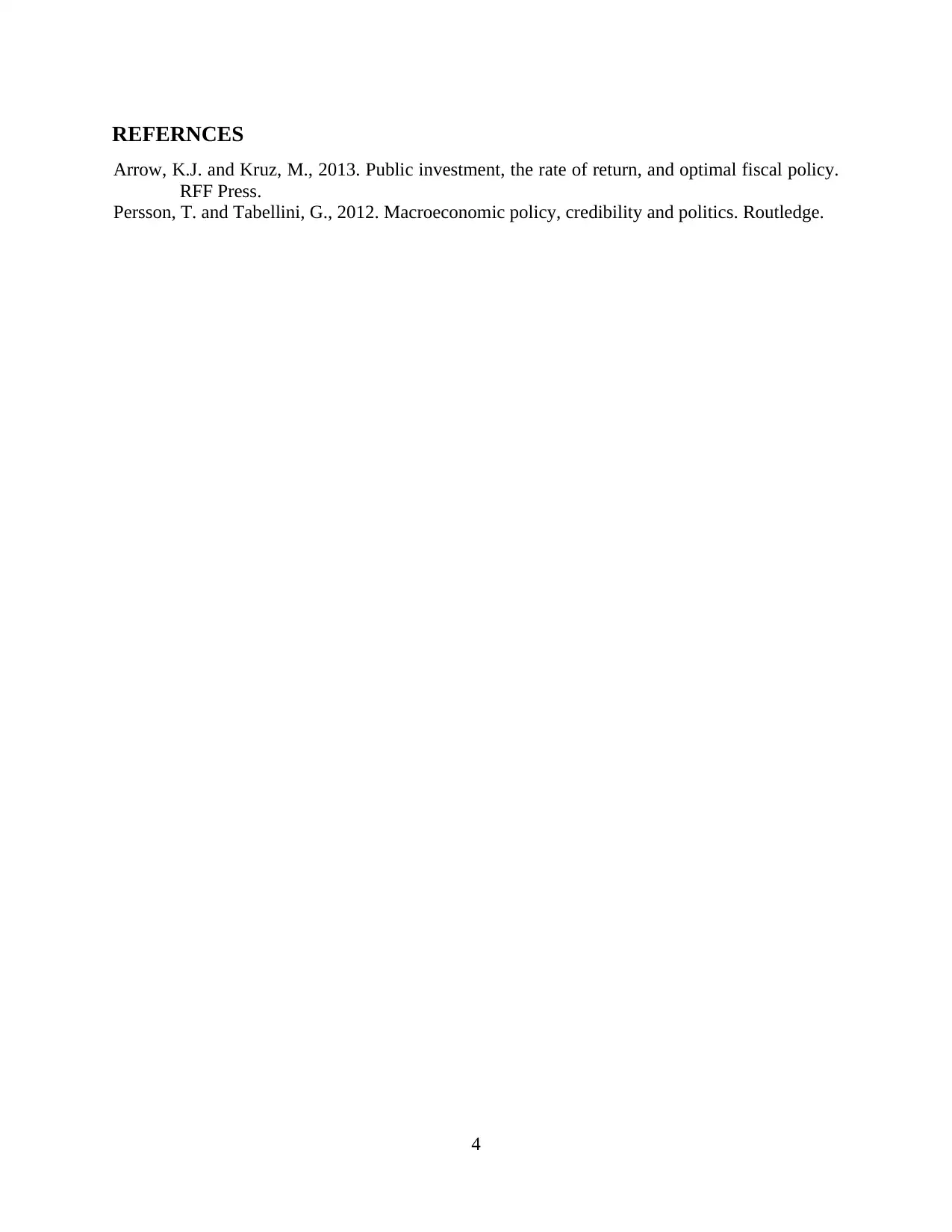
REFERNCES
Arrow, K.J. and Kruz, M., 2013. Public investment, the rate of return, and optimal fiscal policy.
RFF Press.
Persson, T. and Tabellini, G., 2012. Macroeconomic policy, credibility and politics. Routledge.
4
Arrow, K.J. and Kruz, M., 2013. Public investment, the rate of return, and optimal fiscal policy.
RFF Press.
Persson, T. and Tabellini, G., 2012. Macroeconomic policy, credibility and politics. Routledge.
4
⊘ This is a preview!⊘
Do you want full access?
Subscribe today to unlock all pages.

Trusted by 1+ million students worldwide
1 out of 6
Related Documents
Your All-in-One AI-Powered Toolkit for Academic Success.
+13062052269
info@desklib.com
Available 24*7 on WhatsApp / Email
![[object Object]](/_next/static/media/star-bottom.7253800d.svg)
Unlock your academic potential
Copyright © 2020–2026 A2Z Services. All Rights Reserved. Developed and managed by ZUCOL.





